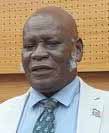
By William Madouk Garang
President Salva Kiir and his deputy Dr. Riek Machar have mulled over National Security Bill that bestowed unfettered (autonomous) authority the rights to detain suspects without warrant of arrest.
On Thursday, the two principals exchanged views on various topics regarding the implementation of the Revitalized Peace Agreement and the way forward.
Addressing the media, the Minister of Presidential Affairs, Dr. Barnaba Marial Benjamin said the meeting was harmonized and cooperative which indicated that the two principals are committed to implement the peace agreement.
“They [President Kiir and Riek] deliberated on the issue of security bill, whether the National Security is supposed to have the power of arrest or not,” read part of the statement posted on the official Presidential Facebook page.
“The President and the First Vice President referred the matter to the Ministry of Justice and Constitutional Affairs for further consultation so that appropriate decision is made,” the statement added.
The two leaders also deliberated on the issue of SPLM-IO parliamentary caucus boycotting sittings and they agreed to resolve the contentious issue through the parliament under the care of the Speaker of R-TNLA Rt. Hon. Jemma Nunu Kumba.
“Furthermore, the two principals also discussed the issue relating to Dinka Ngok and Twic communities over the border disputes and the two principals agreed to form a national neutral committee to address the situation amicably,” it further noted.
National Security Bill
The hotly debated National Security Bill was passed by parliament on October 2014, amid considerable confusion, including walkouts by some of the legislators who disagreed with sweeping powers bill entrusted to security forces.
The bill allows the operatives to monitor frequencies, wireless system, publication, broadcasting station and postal services purportedly aimed at preventing misuses of these facilities by users.
The bill also does have checks and balances against abuse of power, including creation of a complaint board and a five-member advisory group. It also removed immunity granted to members of security forces in previous drafts.
The contentious article 51, which allows security officers to arrest anyone suspected of committing a crime against the state, has its checks and balances: which stipulates that anyone who is arrested has to be brought before a magistrate within 24 hours.
But still to some its ‘controversial National Security bill’ which gives security forces sweeping powers.
Onyoti Adigo who was the leader of SPLM-DC minority in parliament walked out after he called for 72 hours adjournment to give more time to read the amendment that was attached to the bill but his request was rejected.
Shortly they left the chamber, other 116 MPs also walked out in protest.
Henry Odua, member of SPLM representing Eastern Equatoria said he walked out because he felt the bill was being rushed through without thorough debate on some issues.
He also said he does not agree with sweeping powers the bill grants security officers, such as being able to arrest someone without arrest warrant.
A group of national and international human rights have been extending their voices to President Salva Kiir to veto the bill and send it back for revision and amendment.



